Strictly Confidential
Series “K”.
SPECIAL REPORT
ON WORKERS’ REACTION TO THE ARTICLE OF COMRADE STALIN AND THE LATEST DECISIONS OF THE CENTRAL COMMITTEE OF THE ALL-UNION COMMUNIST PARTY OF BOLSHEVIKS ON COLLECTIVIZATION.
DNIPROPETROVSK DISTRICT. At the Petrovsky plant 20/Sh in the group of rollers of the rolling mill, they started talking about the latest resolution of the Central Committee. Worker BIZHKO, who was present at the time, said: “I fully welcome Stalin’s article, since indeed in some places there were facts of distortion of the party line by some rural workers, especially during the liquidation of the kulaks. I was told about cases when middle-income peasants also fell under dekulakization, and this is wrong.” Others agreed with BIZHKO’s opinion.
At the same factory, in the workshop of thin-walled pipes, 18/sh, the worker KOLTSOV expressed the following opinion: “Such a resolution should have been issued a long time ago, too much pressure had been already put on villages. After all, most of the kulaks were wrongly evicted, there are many such kulaks who got rich during the revolution because they got rich not without the knowledge of the Soviet government. Why is the government so inconsistent and interferes with them now?”.
In the group of workers of the open-hearth workshop 17/Sh, a resolution of the Central Committee of the CPSU(b) on the issues of collectivization was read. Ditcher BORODIN said: “I welcome this resolution. It’s no joke about how hard life has become now, the bazaars are completely empty, you can’t live by our salary now. Now the markets will get more active. In addition, the resolution will hit those bureaucrats who tried to use their power to oppress the poor.” It was supported by all present workers in the amount of 8 people.
In another group of workers in the same workshop, the unskilled worker GASINSKY, with the support of a number of other workers, spoke out: “The Party did the right thing when issued such a resolution. The Central Committee realized that the workers would not be able to exist that way. For example, I was really starving with my family and came to the conclusion that instead of improvement, a deterioration is done for the working class. Now I hope that the peasants will be given the opportunity to freely bring food to sell in the market, and our situation will improve.”
KRIVOY ROG DISTRICT. At the Lenin mine, the shaftman ROMANENKO spoke out: “Many misunderstood Stalin’s article. Stalin writes that collectivization is a voluntary thing, but we must not forget that for any bastard obstructing the progress of collectivization, the authorities will put a screw on him. Collectivization is needed, and it will be implemented 100%.”
KYIV DISTRICT. In the Arsenal, such conversations have been noticed among the old staff workers: “In some places, rural workers have really gone too far. They are like that fool who you want to teach to bow with grace and he would fall flat on his face. In the village, because of settling personal accounts, they did all the do’s and dont’s. They almost used whips and made the peasants furious with their actions instead of willing to help the government.” The following judgments have also been heard: “Yes, the peasant question is the most painful issue and it is impossible to tackle it so easily. It is true that you will often have to return but life itself requires it.”
“AUTHORITIES DEVIATE FROM THEIR ORIGINAL POLICY”
MYKOLAIV DISTRICT. At the A. Marty plant, worker MAXIMOV said: “From Stalin’s article it is clear that he is setting back with dekulakization, which is why he was stopped.”
ARTEMOVSK DISTRICT. At the Rykovsky Metallurgical Plant, a worker of the gas-power shop commented about the article by comrade Stalin and the latest decisions of the Central Committee: “We have done things, and now they are starting to back away and declare that the lower classes have distorted the line, demand the opening of street markets, free trade, etc.”.
KRIVOY ROG DISTRICT. At the K. Liebknecht mine, the machine operator PRONCHENKO, when the workers started talking about collectivization, said: “First, it was necessary to organize this effort in an exemplary manner, on a voluntary basis, rather than how it was done on the ground through coercive measures. Stalin himself and the Central Committee failed in front of the workers and set back. “
At the Kaganovich mine, a winch operator No 7, MOROZ, in a conversation with workers close to him, said: “The party steamed on a cool policy with the collective farms, and now they beat a retreat, and act like Bukharin. All our newspapers lie about the gains of collectivization. In practice, everything is falling apart.” MOROZ – former member of the CP(b)U.
KYIV DISTRICT. In the Arsenal, a worker Khmara, in a group of other workers said: “It is as always, if they do something, they pedal it, and later, when they see that nothing works, they begin to go back, which they did with regard to the collective farm movement.”
“NOW THE COLLECTIVE FARMS WILL DISINTEGRATE.”
DNIPROPETROVSK DISTRICT. At the Lenin plant, a turner of the pipe shop AFANASIEV said: “The party saw that it had gone the wrong way, and beat the retreat. However, the resolution worsened the working conditions for the involvement of peasants in collective farms. Now, the peasants would not want to collectivize at all.”
STALIN DISTRICT. At the Stalin metallurgical plant, the gas treatment worker of the assembly subdivision of the CCU, SAKUROV, in a group of 11 workers said: “I will buy several issues of the newspaper and send it to the village; there, the peasants are so scared, they are so much afraid of collectivizers, but when they receive these newspapers from me, they will read and take their farms from the collectives back home, and they will run their farms individually, as before.”
KYIV DISTRICT. At the Red Banner Plant, some of the workers say: “Now all the collective farms will collapse because it is clear from the resolution that it is impossible to force them to join the collective farm, and until now the collective farms had been formed by force only.”
KHARKIV DISTRICT. At the Tinyakov factory, the following conversations have been observed: “The collective farms have all collapsed, the peasants are leaving the collective farms, which was caused by forced collectivization, and most importantly – the recent explanation about voluntary joining of the collective farms.”
“STALIN’S LETTER UNDERMINED ALL THE WORK.”
KHARKIV DISTRICT. SASHCHENKO, the 25,000-performing worker who arrived at the Gortramway, told the workers: “Stalin’s letter undermined all the work. He should not have written such an open letter. The peasants find fault with each word, and everyone would thrust the newspaper under your nose. Because of this letter, they withdrew a lot of livestock, grain, and equipment and left the collective. In the village of Kovyagi, almost everyone has dispersed, and we are now extremely worried that there will be no breakthrough with seeding. ”
“THE ARTICLE WAS WRITTEN IN BAD TIME.”
KRIVOY ROG DISTRICT. At the Kaganovich mine, 26/Sh in the office of the mine committee, a regular worker ZALEVSKY, in a conversation with other workers about the state of collectivization, said: “The situation with collective farms is not right, the peasants are escaping from there. In my opinion, soviet collective farms were organized too early. They should have waited a bit with that, and in the meantime educate and prepare the masses. In addition, Stalin wrote his article in bad time – it should have been written either a month earlier or later. “
“STALIN WILL SOON BE CALLED AN EVADER.”
KRIVOY ROG DISTRICT. At the Kaganovich mine, in barracks No.32, there was a conversation about collectivization. A driller KIRYUKHOV said: “Stalin is right, proper, and reasonable in that article, but soon he will be called an evader, like Rykov. It will be regretted when a man like Stalin is thrown out of the party. “
“TOO LATE TO CHANGE THEIR MIND”.
STALIN DISTRICT. At the Makeevka Metallurgical Plant, in the blast furnace shop, a worker KRASILNIKOV, who was anti-Soviet, spoke out: “It is too late for Comrade Stalinto correct his mistakes. The village will not forgive you, spring is coming and there will be a sense of gunpowder in the air. “
KYIV DISTRICT. There is an anti-Soviet group at the Pischetrest Brewery, led by a worker CHIKANETS. This group has been talking among the workers in recent days: “The Soviet power is failing because the peasants are opposed to it and do not want to join the collective farm, but not because the Soviet power wanted it. The party got scared and is now pressing back but it is too late – the party’s policy has turned all people against them, and now they no longer trust it. “
“FIRST THEY DO THINGS, AND THEN THEY FIND EXCUSES.”
STALIN DISTRICT. At the Rutchenkovsky mine management office, a worker MINAKOV said: “Stalin’s article on collectivization is the smearing of wounds that have already been inflicted. After all, the Soviet Government always acts like that – first it will deal a fatal blow, and then it begins to protect itself. The same happened last year. First, all peasant farms were ravaged by excessive taxes, and then they began to write that that was a distortion of the party line.”
The operator of the cutting machine of mine No.30, in the presence of 20 young people, said: “The party set a course for the collectivization of peasant farms incorrectly. They only realized it now, and try to find excuses claiming that the directive they issued was allegedly misunderstood and distorted on the ground.”
KYIV DISTRICT. At the Red Banner Plant, the workers of turning shop the BURKO, ZHUK, and OSTAPCHENKO, in a group of other workers said: “First, they hit with a ton of bricks, and now they are disillusioning, they are falling back to the old ways.” They were not supported by anyone present.
“THE PARTY REALIZED THEY WERE WRONG.”
KRIVOY ROG DISTRICT. At the Artem mine, a shovelman SHEVCHENKO, having gathered a group of workers around him, spoke out: “The party took the rapid pace of collectivization, but now they realized their mistakes and write about voluntary collectivization.” The attending workers remarked to him: “The fewer collectives there are, the richer they will be. On top of it, our state is strong and we are able to assist the cause of collectivization and strengthen the collectives. “
“THE PARTY CHANGED ITS POLICY UNDER THE IMPACT OF PEASANT PROTESTS.”
DNIPROPETROVSK DISTRICT. At the Lenin plant, in the workshop of thin-walled pipes, in a group of workers, one worker expressed his opinion: “The decision was made only because the peasants went too sharply against the collective unions and communes – all the way to the uprising. The party decided that arguing with the peasants would not do any good, and softened the tone. The center has some smart people there, and they realized they failed they hit the retreat. “
At the Petrovsky plant, in the bridge shop, the driller/surname unidentified/, talking about the recent resolution of the Party Central Committee, said: “Local authorities wanted to rapidly eliminate kulaks, to organize collective unions everywhere, and the highest authorities watched what would come of it, without giving any precise instructions. Now that the highest authorities have noticed that the population is rebelling, that the peasants will not be joining the collective farms so soon – the Central Committee issued the directive, and everything will go the old ways for some time.”
“CHANGES CAME UNDER THE INFLUENCE OF THE ANTI-SOVIET CAMPAIGN ABROAD”.
MARIUPOL DISTRICT. At the Illich plant, in the group of the rolling shop workers, a plumber SHIPULSKY said: “The lower classes accurately implemented all the directives from the center that were given to them, and now, due to anti-Soviet campaigns abroad, the Central Committee in its resolution pinned the blame on someone else.”
MYKOLAIV DISTRICT. At the A. Marty plant, workers SMIRNOV and BONDARENKO expressed their opinion about the article of comrade Stalin and the latest decisions of the Central Committee on collectivization: “They have been and done and gone, and now they are looking for anyone to be blamed. After all, who gave the orders for the peasants to be rushed into collective unions, but when the whole world went to protest and there might even be the war, then our Stalin retreated and says that this is only in the interests of our enemies, but where have you been before?”.
STALIN DISTRICT. At the Stalin Metallurgical Plant, in a group of other workers, a worker KOZLOV said: “The Soviet power got scared of the crusade brewing under the influence of capitalists. Now they open the market and dissolve the collectives, after all they are afraid of death. “
At the Chaikino Mine Administration 19/Sh, on the shift at the Novo-Chaikino mine, the cage loader BEZRUKAVENKO said: “In the newspaper, Stalin gave the order to dissolve the collectives and run a campaign on a voluntary basis because the Pope is going to go to war against the USSR. The churches that had been closed will also be restored. “
KYIV DISTRICT. At the Bolshevik plant, in the model shop, in a group of workers, one of them said: “This is a retreat, and even a shameful retreat. It is a shame and a disgrace that under the influence of the Pope’s pressure, we started retreating along the entire front. ”
“THEY BROUGHT IT TO THE POINT THAT THEY THEMSELVES GOT FRIGHTENED.”
DNIPROPETROVSK DISTRICT. At the Petrovsky plant, in the foundry shop 21/Sh, a locksmith MIKLASHEVICH, an anti-Soviet Pole, came to work and told the workers: “The Central Committee got frightened and is now trying to concede. At first, they dekulakized everyone and everywhere, Ihave seen it all; and then suddenly the grassroots organizations turned out to be bad and the Central Committee issued a new order. “
KYIV DISTRICT. At the OMP shoe factory, a worker PANSHIN, a party member, said: “In small places, it was horrible, peasants were thrown into the streets, and their houses were ravaged to pieces. There was an uprising against the authorities in Belarus. It was brought to the point that the Central Committee itself got frightened. “
“THEY CHANGED THEIR MINDS WHEN THE ECONOMY HAS ALREADY BEEN RUINED.”
ARTEMOVSK DISTRICT. Worker MATIUKHIN, in the presence of some other workers, said: “Nice tangle has been made with this collectivization. Now you won’t see meat and fat anytime soon. There was no need to touch the peasants. Now the government has noticed things went south, and says that there had been many distortions, but it’s too late. The peasant farms are already ruined. Now the peasants do not know what to do themselves. “
At the Krasny Khimik plant, the operator of the oxygen department LITVINOV, talking in a group of workers about the article of comrade Stalin said: “Look at how Stalin knows how to disguise himself, and it was none other than him to issue such a directive to the lower classes. Now, when the peasants were totally robbed, when they were herded as sheep into collectives, it was only then that he decided to write about the lower classes incorrectly implementing his directive. “
STALIN DISTRICT. At the Makeevka Metallurgical Plant, in the blast furnace shop, a group of workers started talking about collectivization. Worker KRASILNIKOV said: “Stalin writes in the newspaper “Pravda”about the implementation of total collectivization, where he points out that his head is swollen from rumors of what is being done on the ground. In his article, he points out that collectivization should cover no more than 20% and not force anyone, but it shall only run only on a voluntary basis. That’s when they figured it out, when they had already dispossessed everyone and the peasants had slaughtered all the cattle. “
KHARKIV DISTRICT. At the KhPZ, workers BONDARENKO, GAMELEY and others said the following about Stalin’s article: “They caught on when they had already dekulakized the poor, when the farms were pillaged. They did such things in the village that in the event of an attack on us by the Western bourgeoisie, the peasants could not be given rifles in their hands. They will turn against the workers anyway. ”
“COULDN’T YOU HAVE FORESEEN THIS BEFORE.”
ARTEMOVSK DISTRICT. At the Rykovsky Metallurgical Plant, a foundry worker KRYUCHEK, reading the newspaper “Pravda”, in a group of 6 people, spoke out: “We have long been talking about this, that there are many distortions. Of course, this is the work of the counter-revolution, who sit in the center and take a too harsh line towards the peasantry. Now they have come to their senses and begin to correct the line taken. After all, the results of collectivization that we have today could have been foreseen in advance. “
“STALIN ‘S POLICY PROOVED WRONG.”
STALIN DISTRICT. At the Stalin Metallurgical Plant, in a group of workers at the plant station, the worker on duty, SEMIDOTSKIY, said: “It is now clear that Bukharin was right when he said that collectivization in the villages and industrialization shall not be carried at such a rapid pace. When he signed the statement that he agreed with the party’s policy, it is clear that he did so under pressure. Stalin’s policy did not pay off in practice, he was too hasty to build socialism within 5 years. In practice, it turned out that it was too early, the peasants were not workers and would not voluntarily join the collectives.”
“STALIN PROTESTS, BUT FOR SOME REASON EVERYTHING IS IMPLEMENTED.”
STALIN DISTRICT. At the Stalin Metallurgical Plant, in the boiler and bridge shop, in a group of workers, the locksmith MOLCHANOV said: “Stalin protests against collectivization by force, but for some reason this collectivization is carried out by force throught the entire Soviet Union. Such measures will not lead to the resolution of the agricultural issue. ”
At the Petrovsky Mine Department, the worker of mine No.1, GRISHAEV, said: “Our local authorities, as you can see, do not follow the directives of higher organizations, but do it in their own way. Stalin’s article clearly indicates that it is voluntary to join the collectives, and in our country this is carried out by force, and the peasants are threatened with basements. “
PEASANT ELEMENT OF ENTERPRISES.
DNIPROPETROVSK DISTRICT. At the Petrovsky plant, in the Bessemerovsky workshop, the worker GONCHAR (from the peasants), in a group of workers, said: “In the villages, many peasants were incorrectly dekulakized, previously they were forced to join the collectives, and now, after pressure from above, they say they do not force anyone and everything, is allegedly voluntary. If there was no such deception, the peasants would gladly join the collectives. “ Those present agreed with him to the extent that mistakes were indeed made in some places during collectivization.
ARTEMOVSK DISTRICT. At the Krasny Khimik plant, a worker of Slavstroy, LISTROVA, connected with the village, said: “The peasants were crushed financially and offended, and now that all this has been done, they began to write about various distortions. Those who write and issue laws need to be brought to the middle of nowhere. Our church was also closed without any the consent of the workers, but it was forced to register for closure, when threatened with deprivation of the right to vote and dismissal from service. “
STALIN DISTRICT. At the Rykov plant, a worker YAKUBENKO, who has a farmstead, systematically holds conversations among the workers: “They collectivized up to the point that they have already begun to punish and arrest themselves. There is already an order of the authorities available to dissolve all the collectives, to open all the churches that have been closed. Stalin himself writes about this, and he wrote it because the Soviet government was afraid of foreign states that threatend war if the collectives were not dissolved and the churches were not opened. “
At the Rutchenkovsky mine administration, a worker MASLENKOV, who has a farmstead, spoke in a group of workers: “This is no less than Stalin’s sortie. For some reason, he protects himself, and all the outrage committed in the village are attributed only to local authorities. And where was the center when the first directives on collectivization were given?”
KRIVOY ROG DISTRICT. At the Lenin mine, a shoveler NEKOZAKOV, related to agriculture, said in a group of workers: “This year, the land in many places will not be sown, since the collapse of collectives is a massive phenomenon. The weirdos have brought it to the point that the fields will now go down the wind, and how would the authorities try to take bread from the peasants when they have nothing available. “ He was supported by the shaftman BOCHAROV, also related to agriculture.
At the Proletarsky mining plant, the worker of the Kommunar mine, the shovelman GOZHUR, originating from the village, said: “I was in the village of Shyroky for some 5 days, so all the collective farms dispersed there, the peasants withdrew their property from the collective farms. The women beat the militia men, the chairman of the DEC, and others. Basically, something terrible is happening, and it is happening not only here but also everywhere. The wave runs from the Crimea to the north. “ When the shovelman MOLOTSAY asked how to explain the fact that the peasants were withdrawing from the collective farms, GOZHUR replied: “All this has been happening after Stalin’s article, where he pointed out that there should be no discrimination in the organization of collective farms, and we have an opposite thing happening.”
DEPUTY CHAIR OF THE GPU (State Political Directorate) OF THE UKRAINIAN SSR /CARLSON/
April 3, 30,
No. 64349
Kharkiv

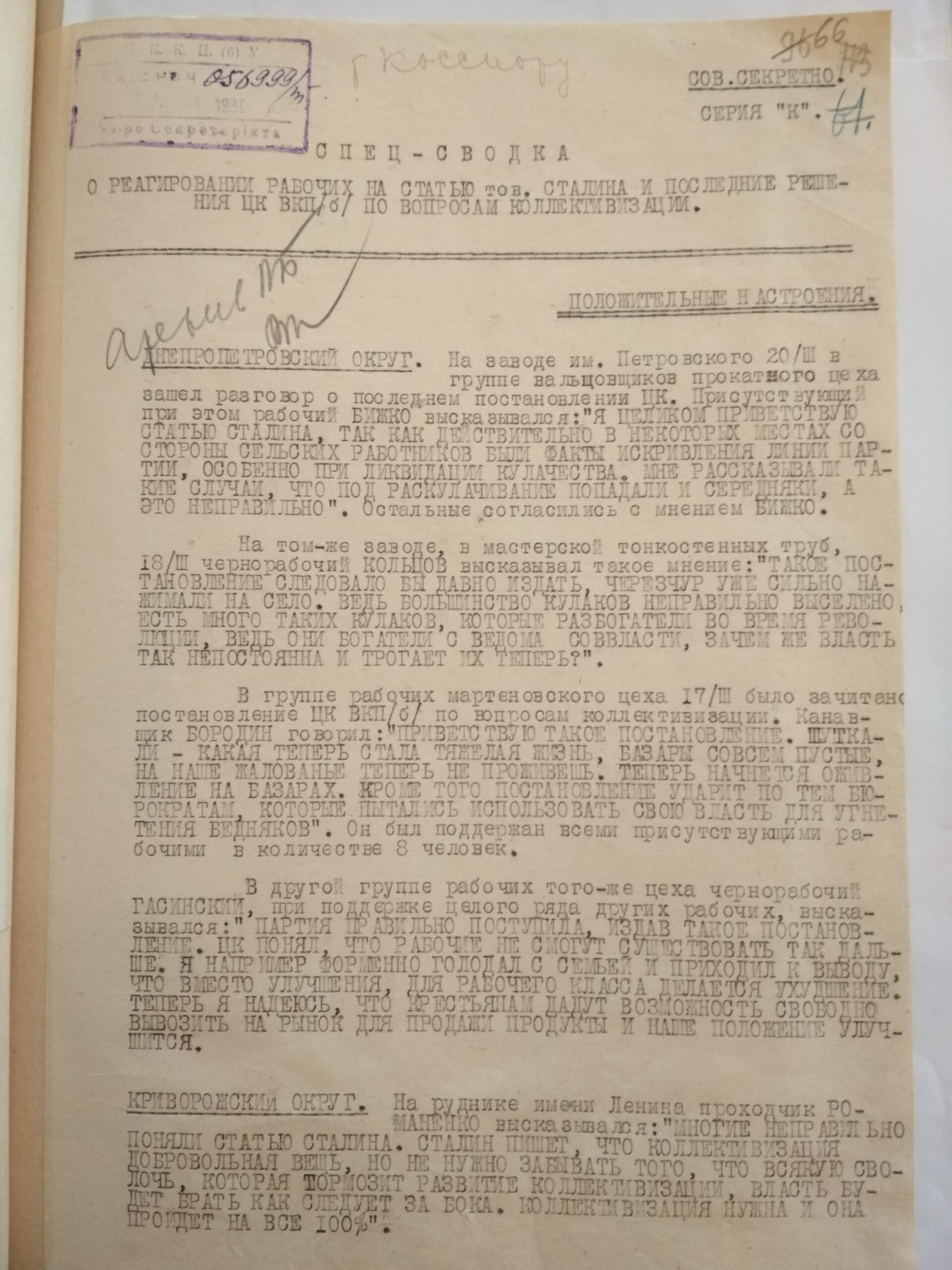
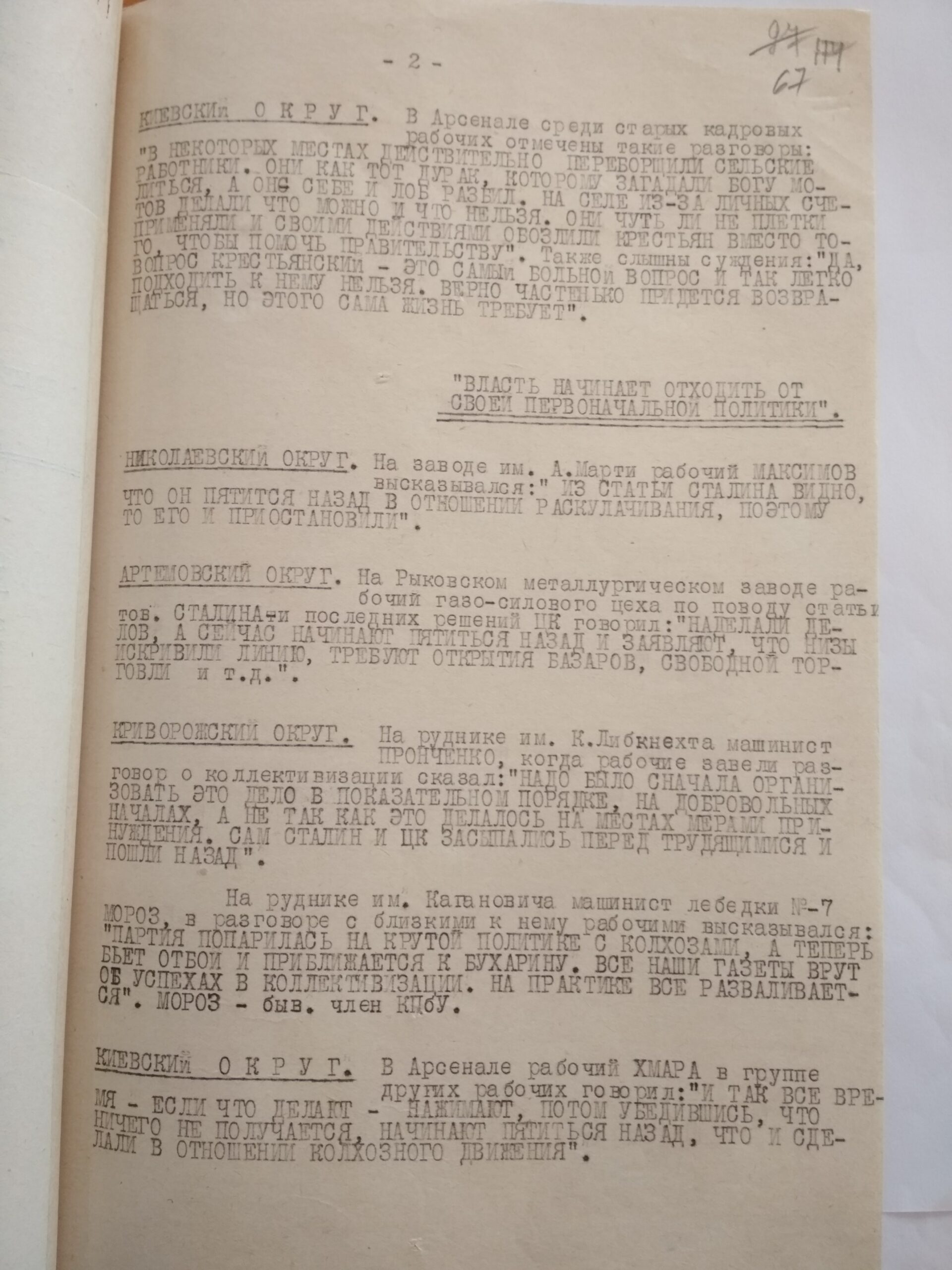
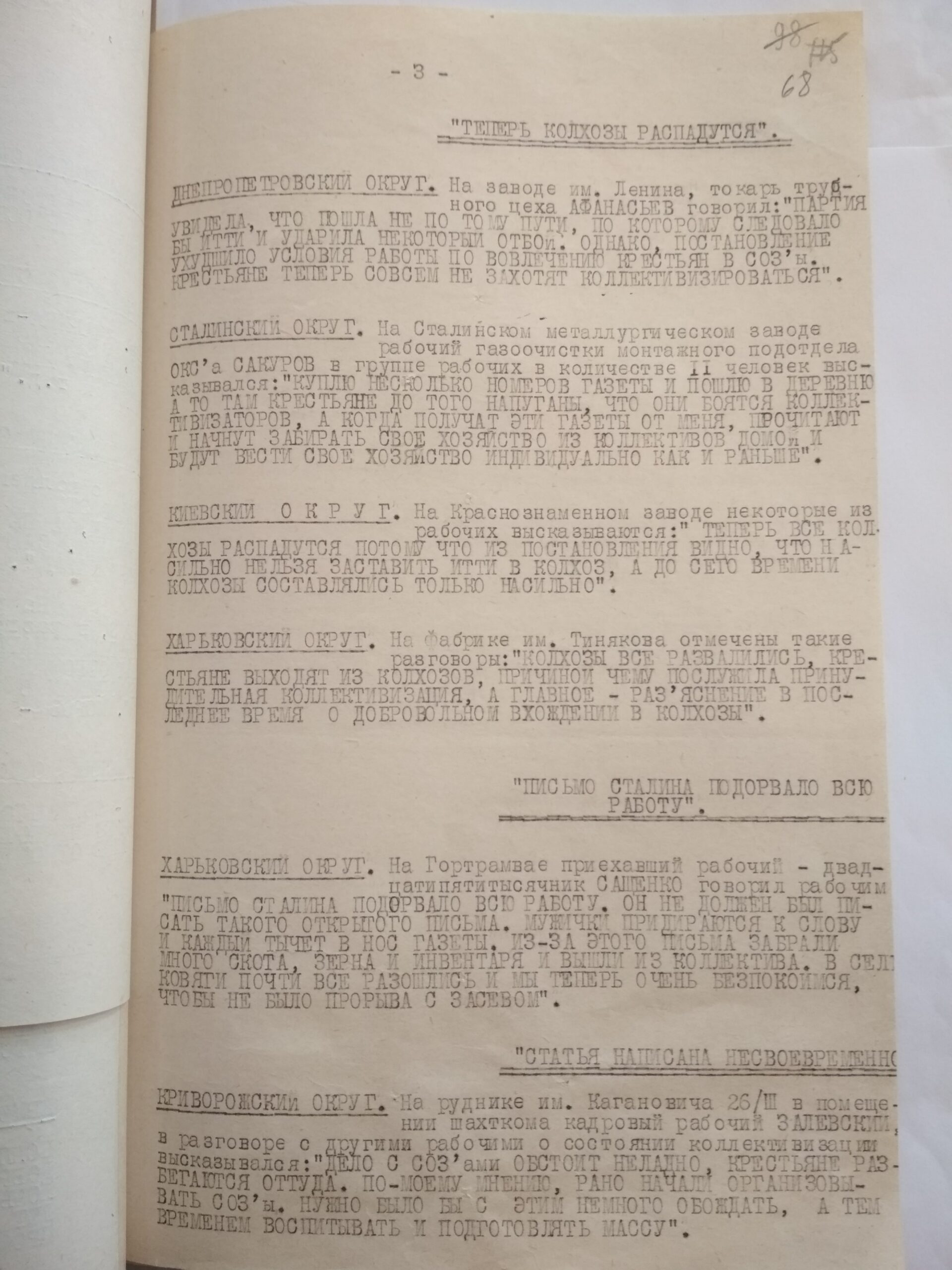
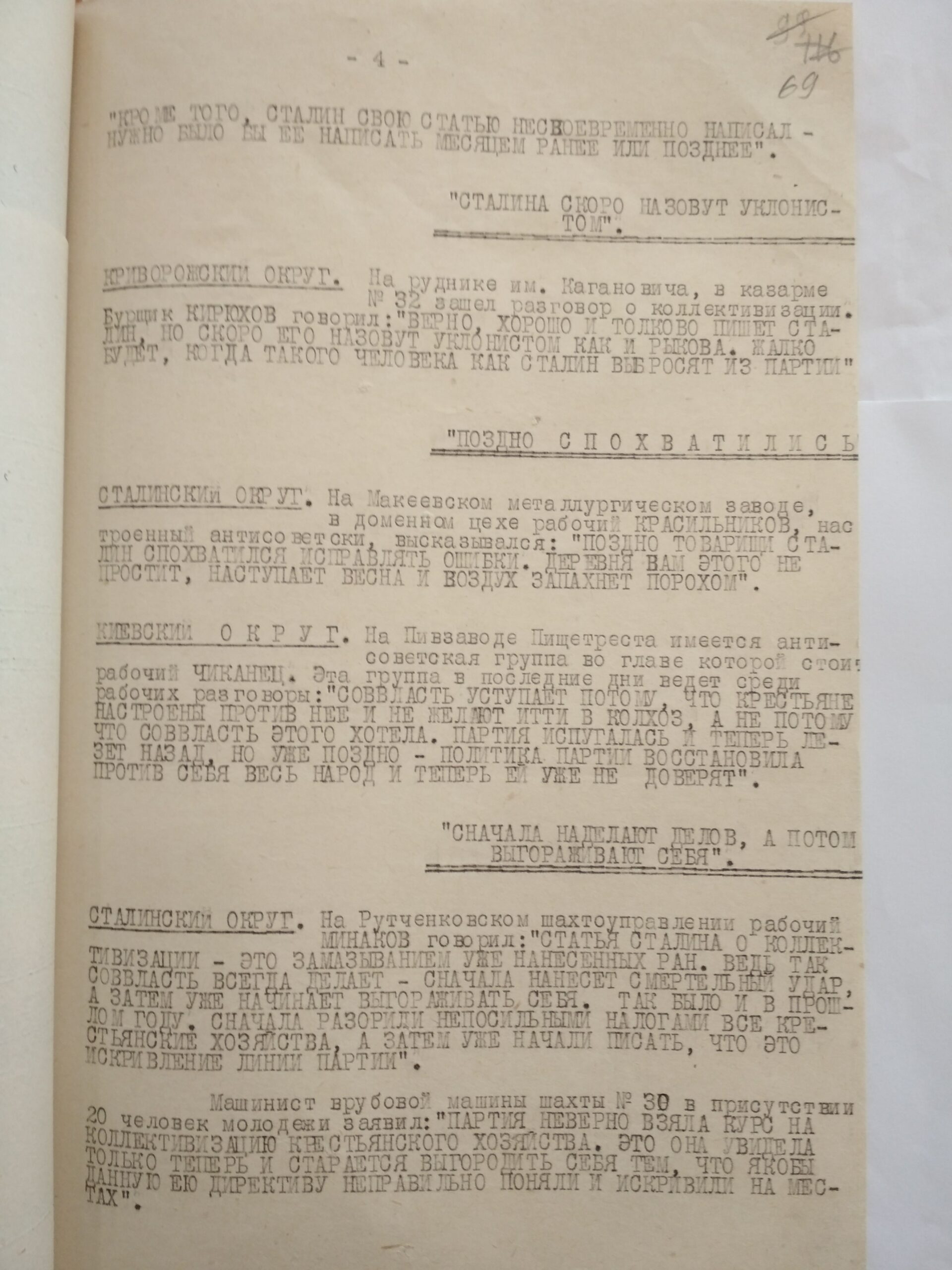
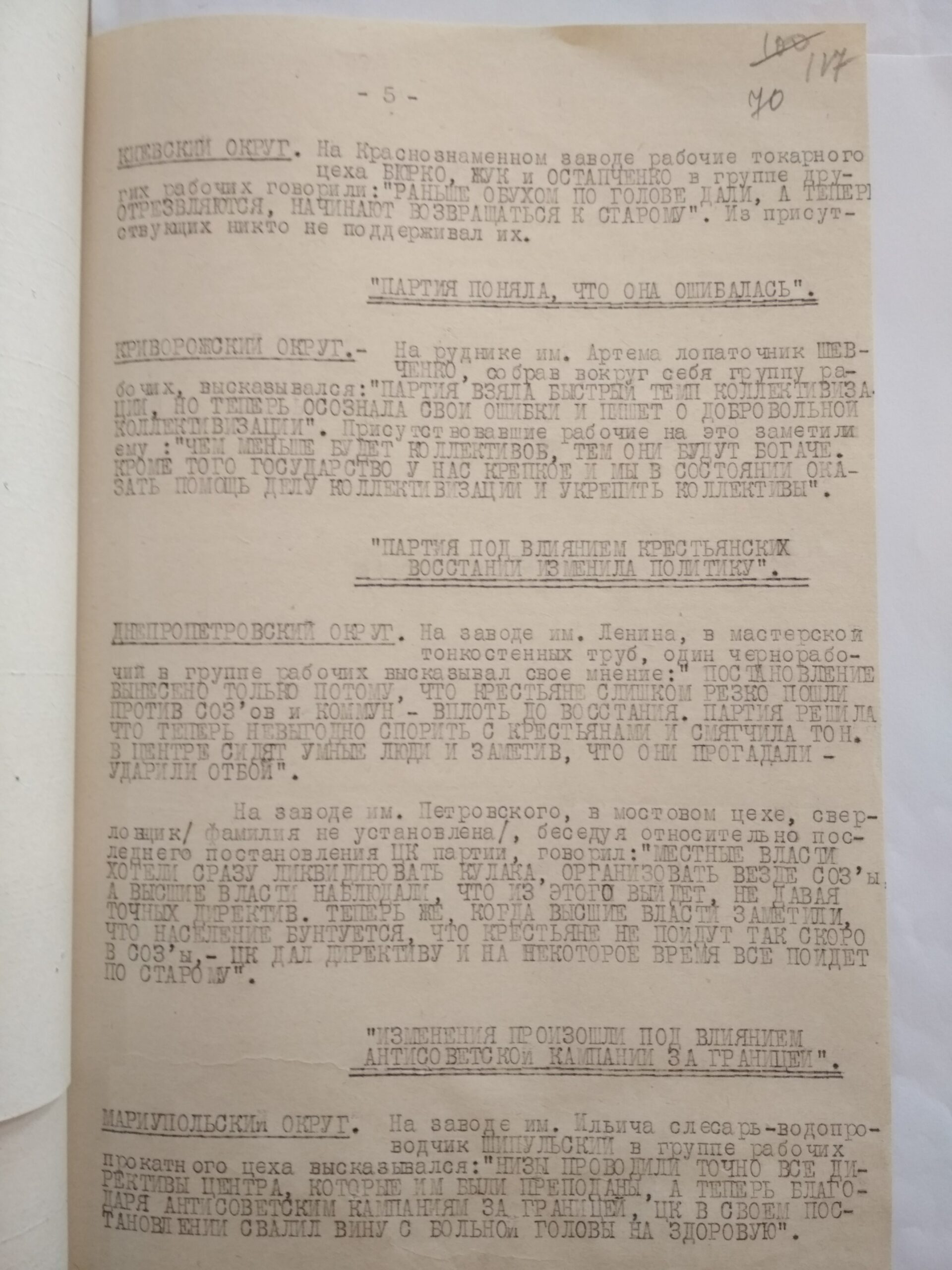
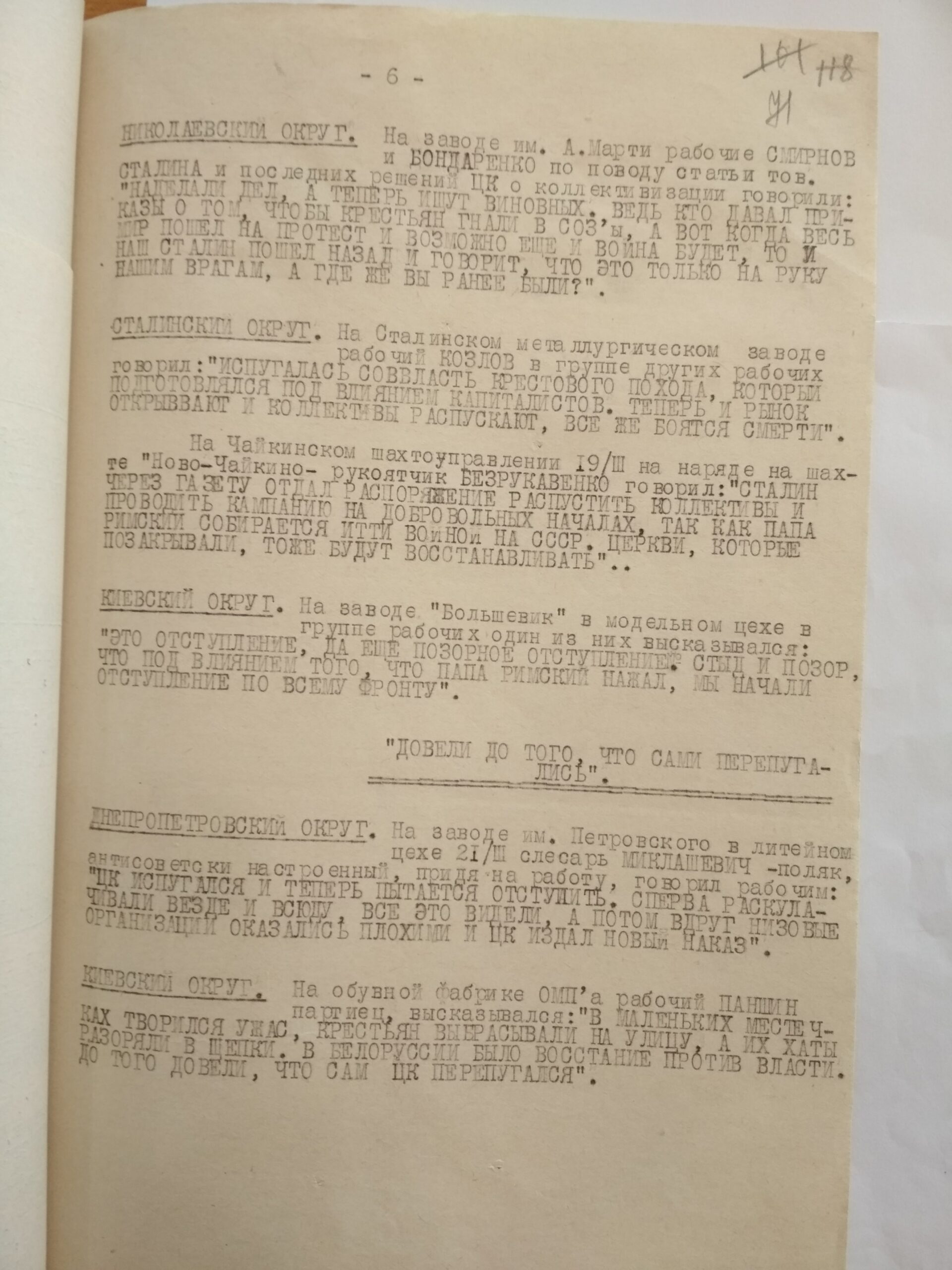
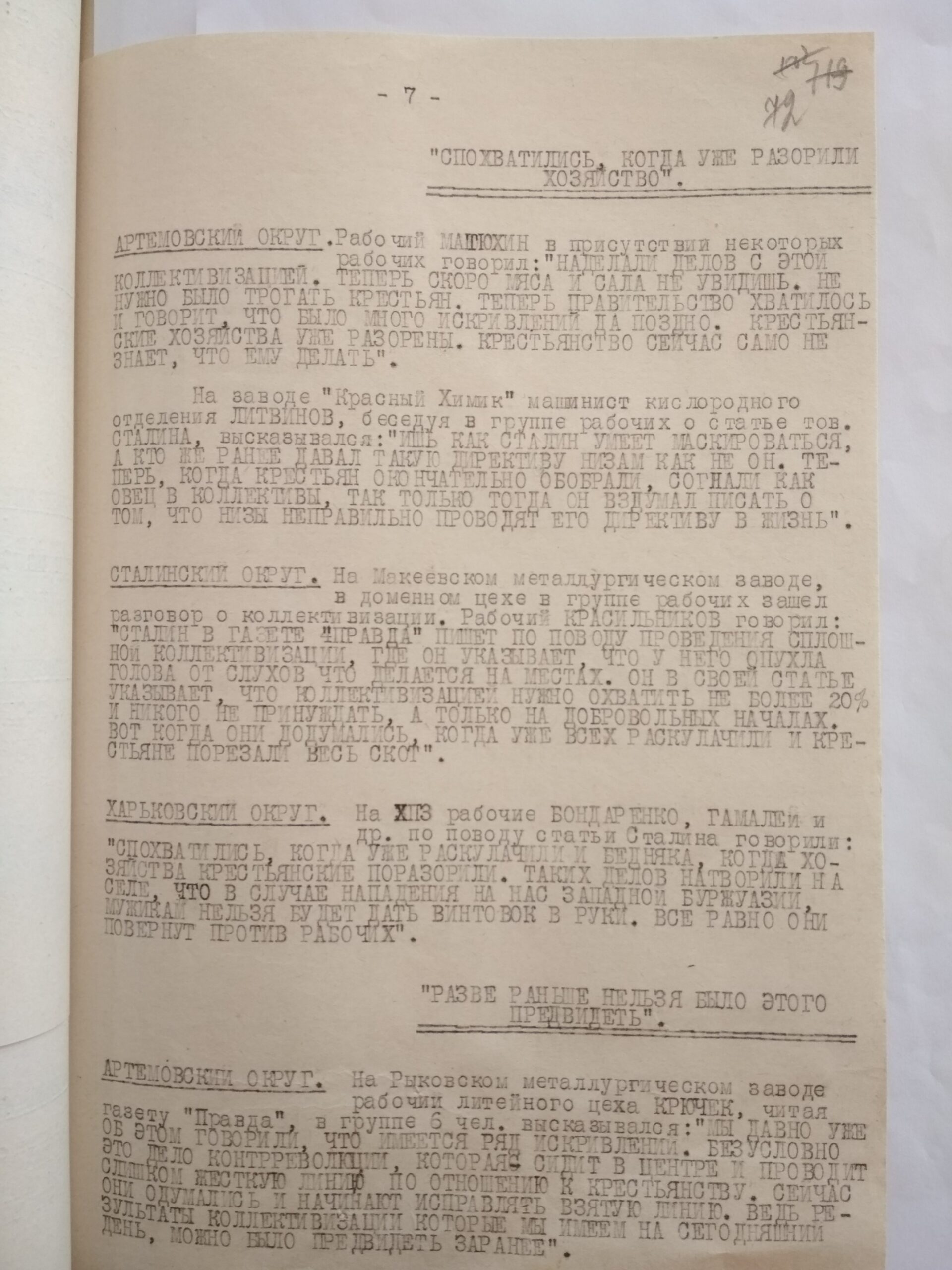
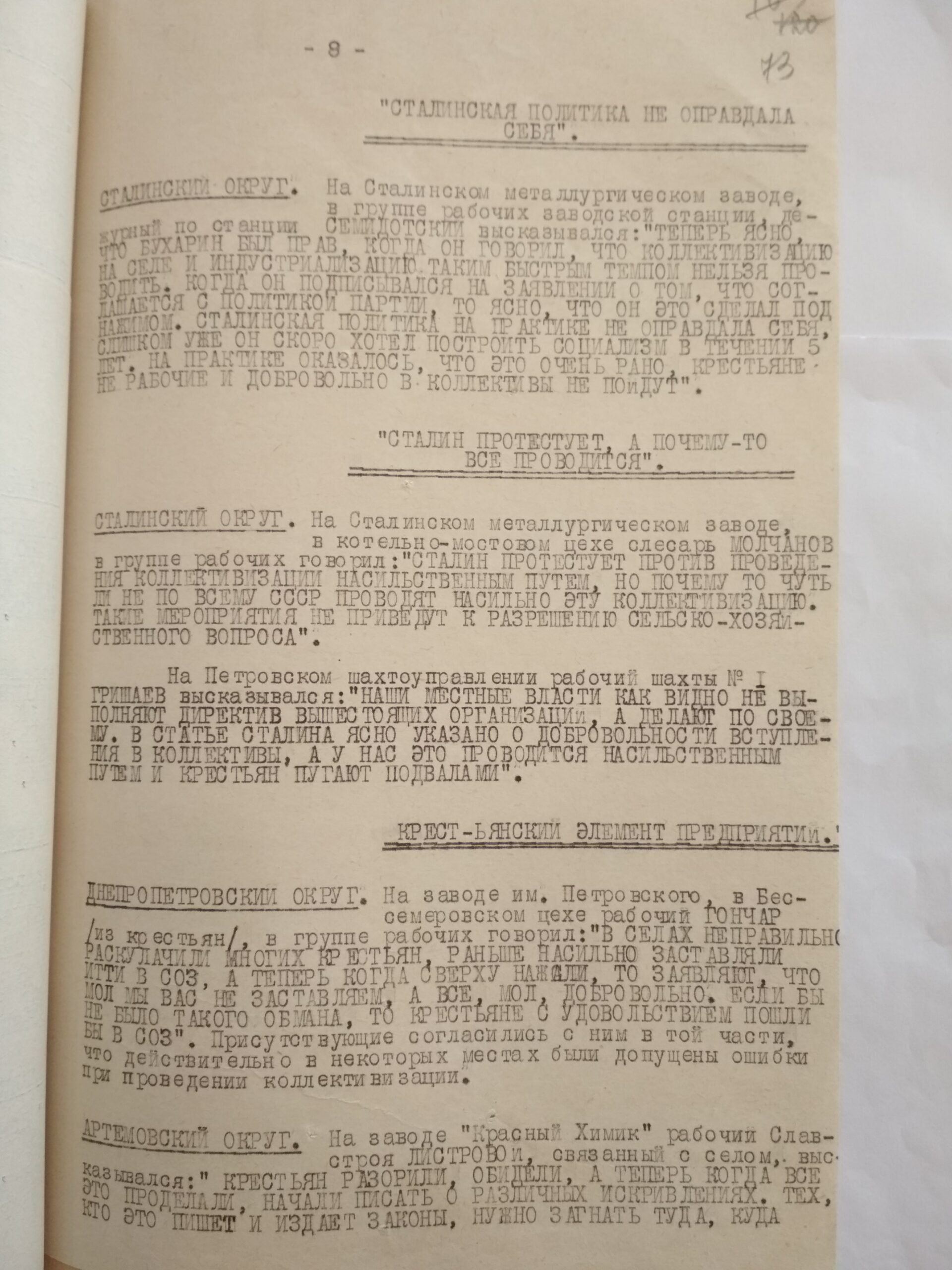
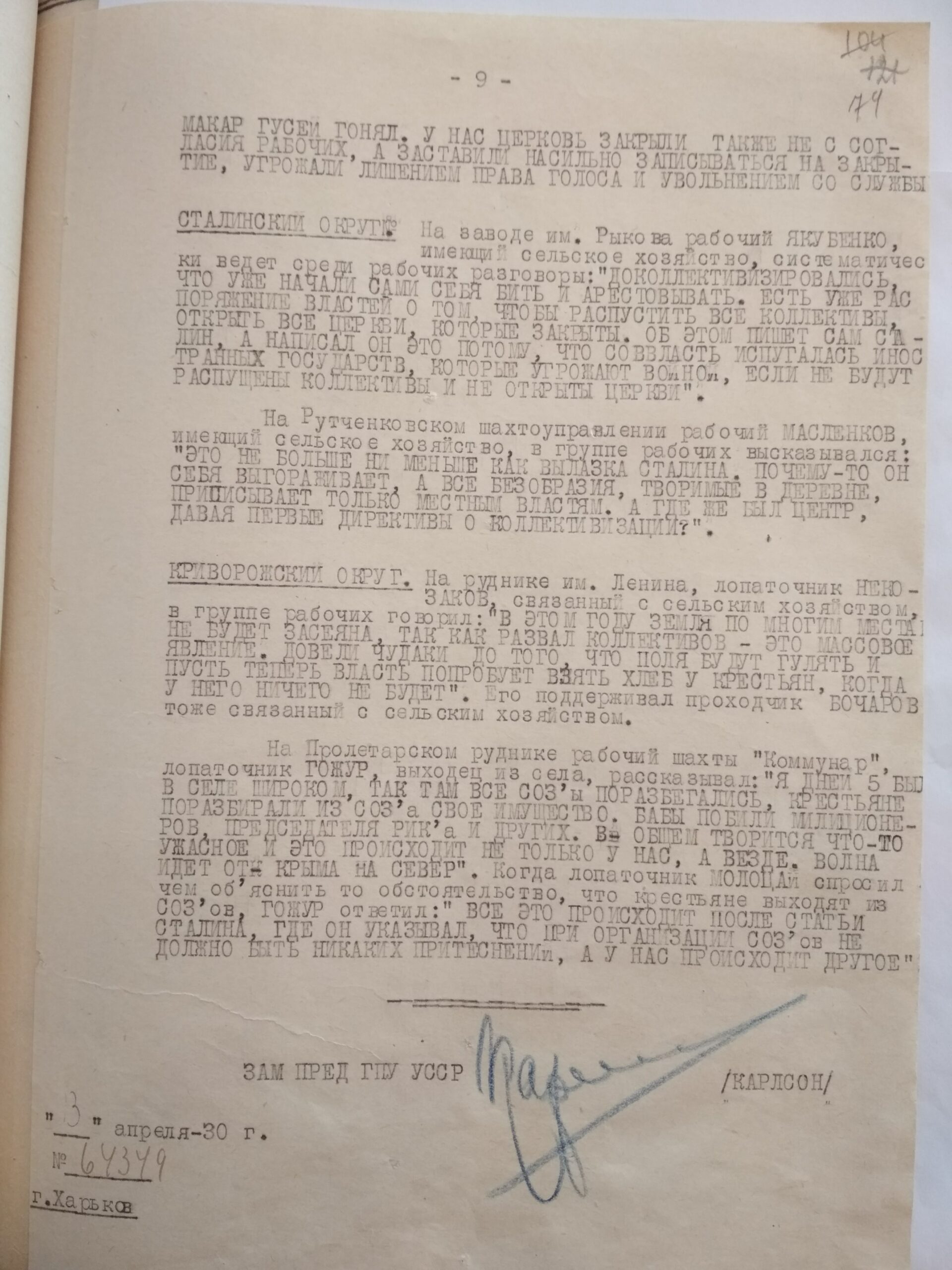
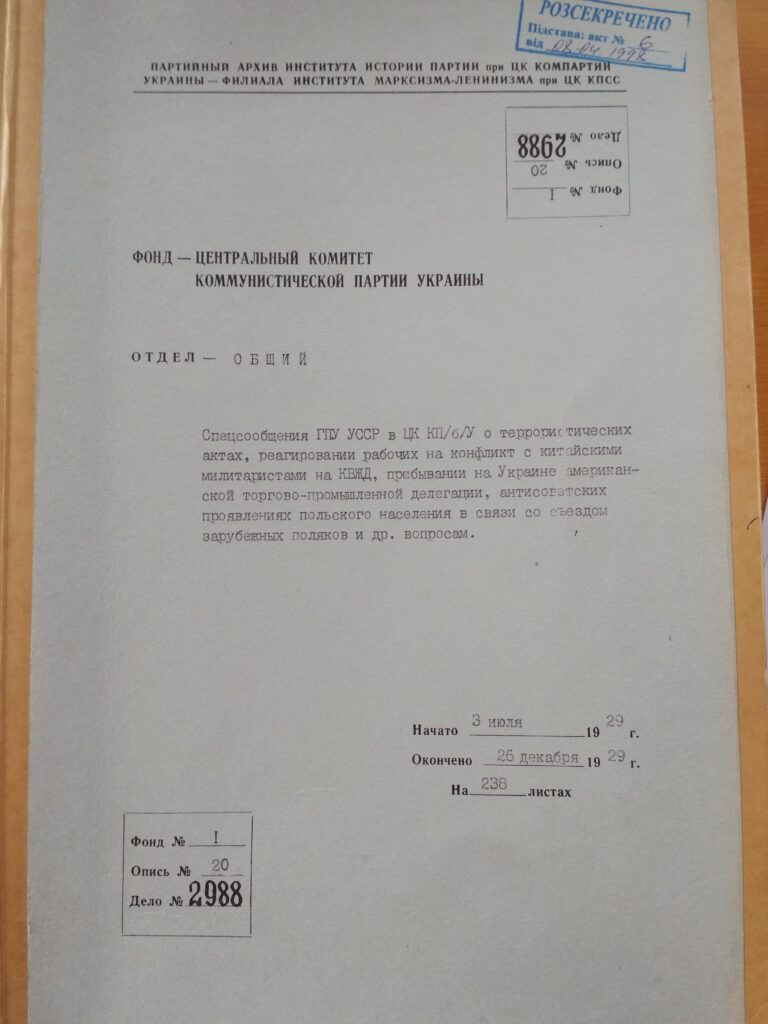
This report was drafted by the political special service authority of the USSR named the State Political Board (SPD, functioned in 1922-1934) for the Central Committee of the Communist Party of Ukraine (CC CP(b)U). It records the reactions of the population of the then Ukrainian Soviet Socialist Republic (USSR) to the article by Stalin “Dizziness From Success (Concerning Questions of the Collective-Farm Movement)” published in the Pravda newspaper on March, 2, 1930. The text includes opinions expressed by workers from Ukrainian industrial plants and mines in their private conversations, and in the work teams. They are mostly quite skeptical and critical about collectivization, the activities of the party, and about Stalin in particular. The workers estimated the article as the evidence of Bolshevik’s withdrawal from their policy, when Stalin tried to make excuses, concessions to capitalists or to the Pope, etc.
Soviet special services collected information through their agents or through “signals sent from the grounds” (denunciation reports). During 1920-1930, such reports had been drafted on a regular basis, according to chronological and theme-based approaches. Authorities were collecting such information to be able to have a more realistic view on the current internal political situation. The research of such reports was made possible after Ukraine’s independence since they had had classified access in Soviet times. They include information about the attitudes of people to different political, social and economic issues, such as the update of collective agreements at enterprises, government loans, arrests of opposition leaders, foreign policy actions of Soviet state, etc. Their analysis offers detailed characteristics of the everyday life of different social groups (mostly workers), to see them as agents of historic reality who reflect on their situation and assess it. It makes the reports about the attitudes an invaluable source in studying the history of Soviet society.